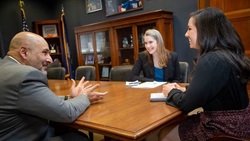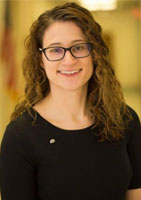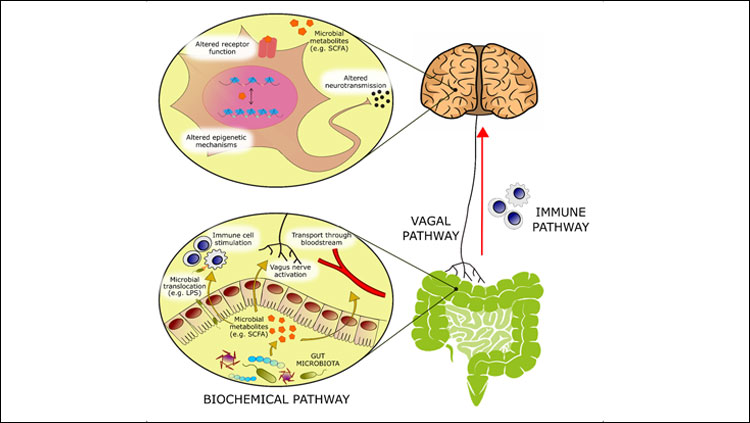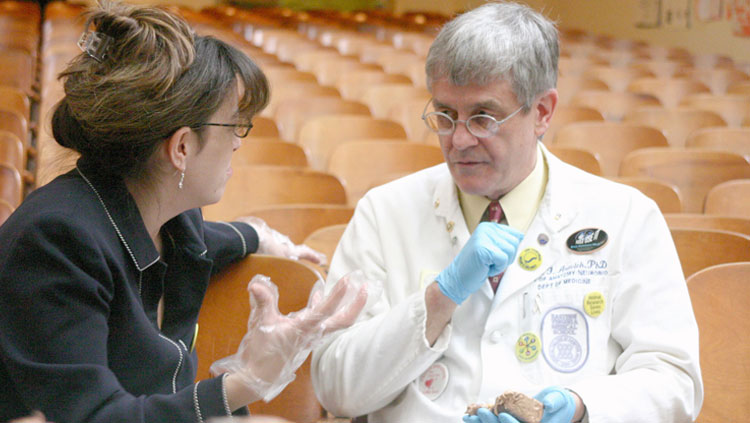Supporting Research Funding Through Year-Round Advocacy

Capitol Hill Day 2020
To push for increased research funding, 34 scientists ranging from SfN leaders to graduate students gathered in Washington, D.C., for SfN’s 14th annual Capitol Hill Day on March 5, meeting with lawmakers to discuss the public value and importance of neuroscience research. Together, these advocates shared one common goal: to push for a strong public investment in neuroscience.
Hill Day is an effective tool for making the case for strong funding commitments and showcasing the importance of research directly to lawmakers. But, as the COVID-19 crisis has recently shown, science advocacy cannot be limited to one day or to ideal circumstances. Science advocacy requires researchers at all career stages to be responsive throughout the year, both virtually and in person.
Reinforcing Online Advocacy
The COVID-19 pandemic undeniably makes some traditional advocacy efforts, such as lab tours and in-person meetings, unavailable for now. However, there are ways to digitally advocate for science. Through social media and video conference calls, for example, researchers can provide a direct link to information about their research and build relationships with lawmakers and stakeholders. Sharing personal stories about how research is connected to COVID-19 and how it has affected work are also effective, especially as the world seeks out scientific opinions.
Beginning a Career With Advocacy

Jennifer Patritti Cram
PhD Candidate, Cincinnati Children's Hospital
Trainees play an important role in fighting for science, exemplified by the graduate students and postdocs who make up SfN’s Early Career Policy Ambassadors (ECPAs). Working with Local Advocacy Key Contacts, as well as SfN’s Government Policy Affairs committee (GPA) members, ECPAs go through a year of advocacy training that launches with meeting legislators on Hill Day to advocate for increased basic research funding.
Early-career advocacy extends beyond ECPA activities, as showcased by 2020 ECPA Jennifer Patritti Cram’s work. Cram, a graduate student at the University of Cincinnati, and fellow student Christin Godale recently co-founded “Science Policy Ambassadors: Union of Concerned Scientists Cincinnati Chapter,” a science policy student organization with plans to increase STEM advocacy efforts in the city in a number of ways.
“If you want to do it, you need to surround yourself with people who want to do it as well and want to work hard to make it happen. Have a strong network, reach out to people.”Jennifer Patritti Cram
ECPA
University of Cincinnati
“Our group’s [future] activities will include direct outreach events at member of Congress local offices and on campus, going to town hall meetings, Brain Awareness Week events, trivia night, and bringing in outside speakers,” said Cram.
For students who want to take similar actions, Cram emphasizes the importance of working collectively.
“If you want to do it, you need to surround yourself with people who want to do it as well and want to work hard to make it happen. Have a strong network, reach out to people.”
Working collectively can be done even with social distancing — virtual collaboration with local SfN chapters, institutions, and other organizations can make a difference.
Building a Community of NeuroAdvocates

Kristin Anderson, Postdoctoral Researcher Columbia University
Approaches to researchers being involved in policy have shifted over the years as neuroscientists realize that their voices are vital and can make a tangible difference.
“I tell students all the time that when I was in graduate school, I never thought I would someday be advocating for science,” said GPA member Laura Martin. “However, I knew that my graduate training was funded by research grants… I found out that I could have a voice and become an advocate for funding.”
Martin also highlights one of the biggest impacts of taking action: spurring others to do the same.
Advocacy can seem daunting. Fortunately, there is a wealth of resources — and fellow advocates — to help get started. But the most important tools an advocate has are their expertise and their story.
“Why not use my first-hand knowledge on the importance of scientific research outcomes to impact science policy at local and federal levels?”Kristin Anderson
Columbia University
“I have seen first-hand how sharing research can inspire hope in individuals suffering,” said Local Advocacy Key Contact and researcher at Columbia University Kristin Anderson. “So, why not use my first-hand knowledge on the importance of scientific research outcomes to impact science policy at local and federal levels?”
There is no wrong time to become a NeuroAdvocate. Join your colleagues in fighting for neuroscience today by taking part in the NeuroAdvocate Challenge.



















